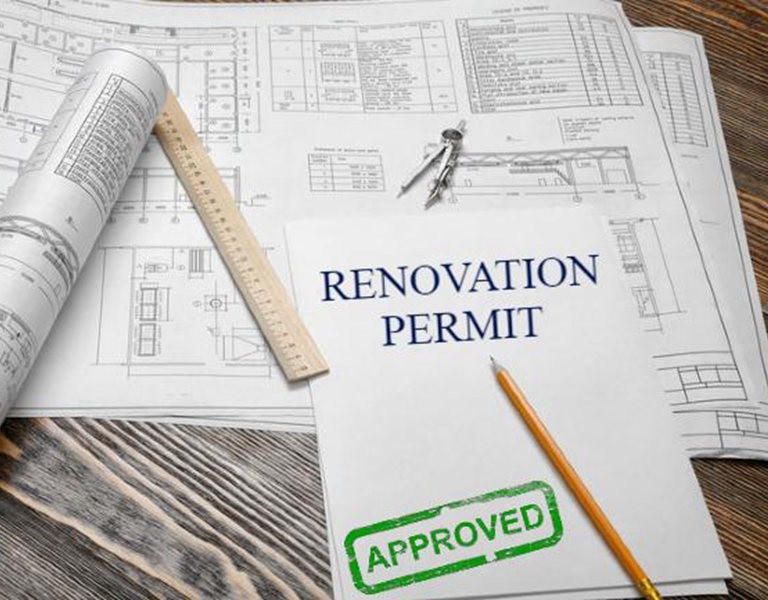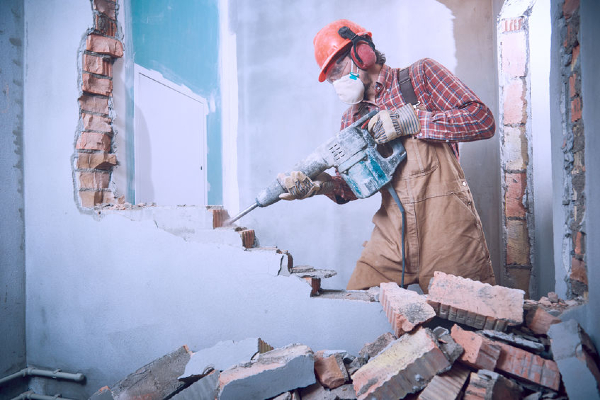Renovations can be a tricky subject to handle. Knowing the rules about house renovation is key to making sure you do it right… and ensuring the local authority doesn’t knock it down with a big hammer of regret!
You might have an amazing vision of how your house will look with an awesome new balcony, but unfortunately you’re likely to need a renovation permit to deliver on it. Curse those pesky laws.
The thing is though, renovation rules aren’t always the clearest, and so keeping within the letter of the law requires a little bit of work and a sensible approach. We’ve put together this guide to help you along the way.
Can I Renovate My House Without A Renovation Permit?
Maybe, but probably not. Not clear hey? Let’s go a bit deeper.
There are rules in Malaysia that allow small house renovations to be undertaken without a permit. However, they are not clearly defined, and that’s why caution should be applied.
The Street, Drainage, and Buildings Act 1974 sets out the laws, under which, renovation works must be agreed on. It notes that:
-
(1) No person shall erect or cause or permit to be erected in any building any partition, compartment, gallery, loft, roof, ceiling or other structure without having the prior written permission of the local authority.
That covers quite a lot of the changes you might look to deliver with a renovation – just look at them go, speaking about all four corners of your house/unit!
And, it’s broad enough that even some seemingly insignificant renovations could easily fall outside the law without relevant permits.
So, Do I Need A House Permit To Renovate?
If you want to be safe (rather than sorry), then the answer is a big loud YES.
It’s obvious why renovation permits are needed for substantial changes. First, there is the topic of ‘safety element’.
A permit might seem like a legal hurdle, but it’s really about ensuring oversight so the relevant authorities can assess and sign off a potential renovation for both health and safety, as well as responsible construction standards.
Without a permit system, your neighbour could create some sort of six-storey monster-bungalow that towers over your property, threatening to fall at any moment.
Permits are designed to stop this kind of thing from happening! If you want a rough idea of what does and does not require a permit, we’ve provided a table with some examples for you below (information taken from the Ministry of Housing and Local Government):
| Permit Required |
Permit Not Required |
| Modification of existing gate and/or border walls |
Installation or replacement of air-conditioning unit |
| Building of pagoda/pergola |
Installation of awning (subject to the guidelines set by the respective Local Authorities) |
| Installation of additional shelter like awning or membranous structure that involves the addition of poles and cables |
Installation or reparation of rainwater downpipes |
| Installation or replacement of wall and/or floor fittings that exceed 6.5 sq m |
Installation of counters and/or built-in cabinets |
| Installation or replacement of plaster ceilings |
Painting works in the house |
| Modification of sanitary ware |
Replacement of water tank (but maintaining original tank size) |
| Any form of modification to fittings that involve a change in the property’s facade |
Installation or replacement of wall fittings, such as windows and doors |
| Building of water catchment system not exceeding a depth of 0.5 metres |
Wiring works for the purpose of landscaping or decorations, CCTV, and automatic gate |
| Building or reparation of plaster cement floors that exceed 6.5 sq m |
Installation of ready-made fish ponds |
Of course there’s also the case of complex legal arrangements to ensure you comply with the relevant rules of ownership for land.
It might be that a proposed renovation actually builds on, or transforms, an area of land that doesn’t belong to the individual seeking a renovation.
It could also perhaps overlap with other state-owned land, or that of a neighbour’s. A permit system helps stop these conflicts before they can start.
Who Is In Charge Of Renovation Permits?
The authority for renovation can be different, depending on if you live in a landed or strata title property.
If you live in a landed property, the local authority (Majlis Perbandaran) is in charge of issuing permits for renovation.
Example: If you’re in Kuala Lumpur, you need a DBKL renovation permit; if you’re in Shah Alam, you need a MBSA renovation permit; if you’re in Putrajaya, you need a MPBJ renovation permit; and so on!
If you live in a strata property, you will require a letter of authorisation from your property management authority. These are rules defined under the Strata Management Act (SMA) 2013.
The Strata Management Act 2013 renovation rules state the following:
- A proprietor shall not carry out any renovation works to his parcel without first obtaining a prior written approval from the management corporation and, where necessary, from the appropriate authority.
- In giving approval for any renovation works, the management corporation may require the proprietor to place an amount with the management corporation as a deposit for compliance with these by-laws or any additional by-laws relating to such renovations works and may require that the renovation works be completed within a certain time.
There are a whole range of other rules and regulations that should be followed, but all can be neatly summed up into “…don’t smash things up and destroy the structural integrity of the building, otherwise you can kiss goodbye to that nice sum of money you left with us as deposit!”
Are There Limitations To Renovations On Strata Properties?
Strata properties do have some specific renovation limitations, owing to the nature of the building (going upwards instead of sideways).
While it might make sense to add an extra floor to a landed terraced house for example, the same ambitions on a strata property might seem a little… weird. Not to mention dangerous!
We’ve extracted the rules for strata property renovation below for you to have a read:
Unless prior approval in writing has been obtained from the appropriate authority and the management corporation, a proprietor shall not-
- construct another floor level to his parcel (e.g. to split the level of any portion of the existing floor in the parcel by adding platforms);
- relocate any external door or window of his parcel;
- remove or make changes to any building safety feature in his parcel and notwithstanding such approvals, the proprietor shall indemnify and keep indemnified the management corporation against any liability which may be incurred or suffered as a result of such removal;
- shift any plumbing and sewerage system in a parcel;
- change or upgrade the whole electrical system in a parcel; or
- illegally connect or tap electricity supply.
In carrying out any renovation works or repairs to his parcel, a proprietor shall not:
- exceed the maximum permissible limit on the drilling or hacking of the shear wall for rewiring of electrical points;
- exceed the maximum permissible floor loading; and
- remove or strip any building joint sealant in his parcel or any part of the common property;
A proprietor shall not tap water or electricity supply from the common property unless prior approval in writing is given by the management corporation.

What Do I Need To Do If I Want To Renovate?
It’s best to be cautious, and seek approval for any renovation before you start. Remember, in a landed property that means the local authority, and in a strata property that means the management corporation!
- Landed property owners should look to create a detailed plan of the renovation, then approach the local authority for relevant permission. The clearer your proposal is, the more likely you are to get an accurate assessment and (hopefully) approval.
- Strata property owners should approach the management authority, taking into account the limitations noted by the Strata Management Act 2013 as highlighted above. A written letter of authorisation is critical to showing your renovation has been approved.
It is highly likely that a management authority will require a deposit prior to renovation, which acts as a guarantee against your works.
This should be returned once the renovation is complete and shown to have complied with the rules of the development.
What Happens If I Renovate Without A Permit?
The people who issue permits do not like it when you renovate without one, obviously.
If you own a landed property and fail to receive permission for a renovation, then the local authority might swoop in with the wrecking balls, and smash it all down.
That might sound drastic, but local authorities are legally empowered to remove or destroy any renovation which requires permission, but have not received it.
In that case, they will undertake the work, and charge you for their costs. That means you not only pay for a renovation you can’t keep, you pay for the people to knock it back down!
If you live in a strata property and undertake renovations without permission, you are liable to a fine imposed by your management authority according to the Strata Management Act 2013 (Maintenance and Management Regulations 2015):
The management corporation may by a resolution at a general meeting impose a fine of such amount as shall be determined by the general meeting against any person who is in breach of any of these by-laws or any additional by-laws made under the Act.
Selling Or Buying A Property With An Illegal Renovation
A final word of warning about renovations! It is technically illegal to sell a property which includes an illegal renovation that was undertaken without permission.
That can make it very tough to sell off your property, particularly if savvy buyers ask to see a letter of permission from a relevant authority about the renovation.
Unfortunately for homebuyers, if you only dig and discover that a renovation is illegal AFTER you purchase the property, you are still liable for its removal or retrospective permission.
Always ask about renovations when purchasing a property, and seek appropriate official documentation to prove that it has been completed within the relevant renovation laws and rules.
If those documents are provided, make sure to ask for a copy too, in case you want to sell the property, or need to prove the legality of a renovation in future!








Comments (0)
No comment